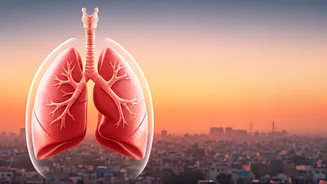Dangers of Smog
Delhi’s air quality has significantly deteriorated, resulting in widespread respiratory problems and amplifying existing health conditions. Experts like
Dr. Vivek Nangia, Vice Chairman & Head of Pulmonology at Max Super Specialty Hospital, Saket, have indicated that while everyone is at risk, specific populations face elevated threats. These highly susceptible groups include children, the elderly, individuals with chronic ailments, and those with compromised immunity. Exposure to high pollution levels can cause a range of symptoms, such as coughing, colds, sore throats, burning eyes, headaches, breathlessness, and chest tightness. Pre-existing respiratory conditions can worsen, increasing the likelihood of upper and lower respiratory tract infections. Long-term exposure to polluted air is associated with accelerated lung aging and heightened risks of chronic respiratory diseases, lung cancer, heart attacks, and strokes, highlighting the severe health implications of the current environmental situation.
Vulnerable Groups Identified
Certain groups in Delhi are particularly vulnerable to the effects of the poor air quality. These include individuals with bronchial asthma, COPD, chronic bronchitis, and interstitial lung disease. Those with chronic heart, liver, or kidney diseases, diabetes, or other comorbidities are also at increased risk. People with low immunity, such as those with HIV, individuals on long-term steroid use, or those undergoing cancer treatment, are highly susceptible. Outdoor workers and daily commuters are constantly exposed to harmful pollutants. Children under five years old and the elderly over 60 are also identified as vulnerable groups. It is crucial for these individuals to take extra precautions to protect their health amidst the ongoing air pollution crisis, as they are most likely to experience severe health consequences.
Protective Measures to Take
Several preventive measures can reduce exposure to pollutants and safeguard respiratory health. Staying indoors whenever possible and restricting outdoor activities to essential tasks is recommended. Maintaining clean indoor air by using air purifiers or HEPA filters is crucial, and indoor plants like areca palms, peace lilies, or snake plants can help. Wearing N95 or N99 masks that filter 95–99% of PM2.5 particles is essential when venturing outdoors. Avoiding burning incense, candles, or mosquito coils indoors and refraining from strenuous exercise outdoors, including morning walks during heavy smog, can reduce exposure. Doctors also recommend using a saline nasal spray to remove pollutants from airways. Furthermore, the use of steam inhalation with a few drops of eucalyptus oil can provide relief. These steps are crucial for mitigating the adverse effects of air pollution and preserving respiratory health.
Home Remedies & Advice
In addition to preventative measures, certain home remedies can alleviate symptoms and support overall health during periods of poor air quality. Staying hydrated and consuming antioxidant-rich foods like fruits, vegetables, turmeric, ginger, cinnamon, and tulsi can help combat the effects of pollution. Practicing deep breathing exercises such as Pranayama, Anulom Vilom, and Kapal Bhati can assist in improving respiratory function. Consulting a doctor for emergency drugs and continuing prescribed medications for conditions like asthma or COPD is crucial. For those experiencing sore throats, gargling with salt water can provide relief. These strategies, combined with professional medical guidance, are essential for managing the impact of air pollution and maintaining health during challenging environmental conditions.












